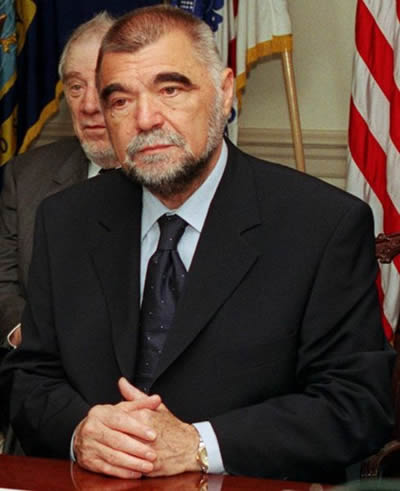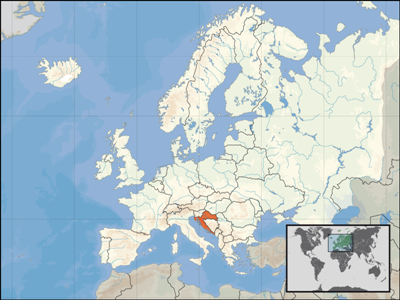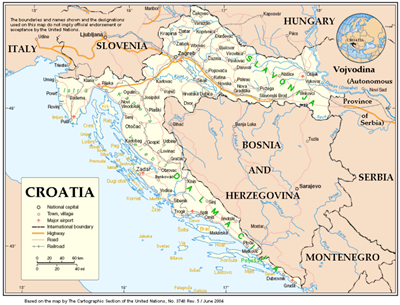|
 |

|
|
|
Stjepan Mesić |
Presedent of Croatia |
Président de la Croatie |
|
|
|
| |
Stjepan "Stipe" Mesić (born December 24, 1934) is a Croatian politician. He has been the President of the Republic of Croatia since 2000. He had previously held the posts of the Prime Minister of Croatia, the president of Yugoslavia, and the president of the Croatian parliament.
Mesić was a deputy in the Croatian Parliament in the 1960s, and was then absent from politics until 1990 when he joined the Croatian Democratic Union (HDZ), and was named the Prime Minister after HDZ won in the elections. He was elected as the Croatian member of the Yugoslav Federal Presidency where he served first as Vice President and then in 1991 as the last President of the full Yugoslav Federal Presidency.
After Yugoslavia disintegrated, Mesić served as the President of the Croatian Parliament from 1992 to 1994, when he left HDZ over disagreemeents about Croatian policy in Bosnia and Herzegovina. With several other members of parliament, he formed a new party - Croatian Independent Democrats (HND). In 1997 the majority of HND members, including Mesić, merged into the Croatian People's Party (HNS).
After Franjo Tuđman died in December 1999, he was elected in two rounds the President of the Republic of Croatia in February 2000. He was re-elected in January 2005 for a second term. As an opposition of Tuđman's personality, relaxed and charming Mesić has many times been voted as the most beloved politician in Croatia.
Early life
Stjepan Mesić, commonly shortened to Stipe Mesić, was born in Debeljak, Croatia to Josip and Magdalena "Mandica" Mesić. After his mother died in 1936, his older sister was sent to their uncle in France, while Stjepan was put in the care of his grandmother Marija until his father was remarried.
Mesić family spent most of the Second World War in refuges in Mount Papuk and Orahovica when it was occasionally liberated. In 1945, the family took refuge from the final fighting of the war in Hungary, along with 10.000 other refugees, and subsequently settled in Našice, where Josip Mesić became the chairman of the District council. The family soon moved to Osijek, where Stipe graduated from 4-year elementary school and finished 2 years of 8-year gymnasium. In 1949, his father was reassigned back to Orahovica, and Stipe continued his education at the gymnasium in Požega. He graduated in 1955 and, as an exemplary student, was admitted to the Communist Party of Yugoslavia.
He continued his studies at the Law Faculty at the University of Zagreb, where he graduated in 1961. Also in 1961, Mesić married Milka Dudundić, an ethnic Serb from Hrvatska Kostajnica, with whom he has two daughters. After graduation, he worked as an intern at the municipal court in Orahovica and the public attorney's office at Našice. He served his compulsory military service in Bileća and Niš, becoming a reserve officer.
Early career
After passing the judicial examination, he was appointed a municipal judge, but soon became embroiled in a scandal when he publicly denounced local politicians for using official vehicles for private purposes. He was nearly expelled from the party over the incident and in 1964 he moved to Zagreb to work as a manager for the company "Univerzal".
In 1966, he ran as an independent candidate in the election for his municipal council, and defeated two other candidates, one from the Communist Party and the other from the Socialist Union of Working People. In 1967, he became the mayor of Orahovica and a member of the Croatian Parliament.
As mayor, Mesić attempted the building of a private factory in the town, the first private factory in Yugoslavia. However, this was personally denounced by Yugoslav president Josip Broz Tito as an attempt to silently introduce capitalism, which was illegal according to the then-current constitution.
Croatian spring
In 1967, when a group of Croatian intellectuals published the now-famous "Declaration" about the Croatian language, Mesić publicly denounced it as a diversionary attack against the very foundations of Yugoslavia and called for its authors to be prosecuted by law. However, in the 1970s, Mesić supported the Croatian Spring movement which called for Croatian equality within the Yugoslav Federation on economic, political and cultural level. The government indicted him for "acts of enemy propaganda". The initial process lasted three days in which 55 witnesses testified, only five against him, but he was sentenced to two years and two months in jail. He appealed and the trial was prolonged, but eventually in 1975 he was incarcerated for one year, and served his sentence at the Stara Gradiška prison, together with several other intellectuals which later became important politicians in Croatia, including Vlado Gotovac and Dražen Budiša.
Return to politics
He was elected again in 1990 as a candidate of the Croatian Democratic Union (HDZ) in the first multi-party elections in Croatia after World War II. He became the general secretary of HDZ and later the Prime Minister of Croatia and served from May until August 1990. He then resigned to take the post in the Yugoslav Federal Presidency where he served first as Vice-President.
Presidents rotated annually according to republic-province key automatically. When Mesić's turn came to automatically become the President, the Serbian Presidency Member Borisav Jović demanded that an election be held. Four members (Serbia, Montenegro, Vojvodina, Kosovo) were against him and four members (Croatia, Slovenia, Bosnia-Herzegovina, Macedonia) were in favor. The election was widely considered to be unconstitutional. Then, European Community mediators convinced Jović to admit Mesić as the President, on 1 July 1991.
When Croatia declared its complete independence, he returned to Croatia and resigned from the Presidency. In 1992, he was elected to Parliament and became the President of the Parliament.
In 1994, Mesić left the HDZ to form a new party, the Croatian Independent Democrats (Hrvatski Nezavisni Demokrati, HND). He opposed the government policy toward Bosnia and Herzegovina, accusing Franjo Tuđman of agreeing to carve Bosnia and Herzegovina with Slobodan Milošević. He also criticized privatization during war and unresolved privatization criminality as war profiteering.
In 1997, he and the majority of his party merged into the Croatian People's Party (HNS), where Mesić became an executive vice-president.
Presidency of Croatia
He was elected President of the Republic of Croatia in the 2000 election after winning the first round and defeating Dražen Budiša of HSLS in the second round. Mesić ran as the joint candidate of the HNS, HSS, LS and IDS. After becoming president, he stepped down from membership in the HNS.
He heavily criticized former President Franjo Tuđman's policies as nationalistic and authoritarian, lacking a free media and employing bad economics, while Mesić favored a more liberal approach to opening the Croatian economy to foreign investment.
As President, in September 2000 he retired seven Croatian active generals who had written two open letters to the public arguing that the current Government administration "is campaigning to criminalize Homeland War and that the Government is accusing and neglecting the Croatian Army". Mesić held that active duty officers could not write public political letters without approval of their Commander-in-Chief. Opposition parties condemned the President's decision as being a dangerous decision that could harm Croatian national security. Mesić later retired four more generals for similar reasons.
President Mesić is active in foreign policy, promoting Croatia's ambition to become a member of the European Union and NATO. He also initiated mutual apologies for possible war crimes with the President of Serbia and Montenegro. After Constitutional amendments in September 2000, he was deprived of most of his roles in domestic policy-making, which instead passed wholly to the Croatian Government and its Premier.
Mesić testified at the International Criminal Tribunal for the Former Yugoslavia that implicated the Croatian army in the war in Bosnia and Herzegovina. The right-wing parts of the Croatian public took issue with this, saying that his testimony contained untrue statements and questioned his motives (he was often branded "traitor"), and noting that much of his testimony occurred before his presidency, as an opposition politician.
He opposed the USA's military campaign against Iraq and Saddam Hussein's regime without United Nations approval and mandate. He improved Croatian foreign relations with Libya by exchanging visits with the Libyan leader Moammar Ghadafi, contrary to the wishes of British and EU diplomacy.
The first Mesić mandate was not marked with historically crucial events such as the Tuđman presidency, and the Croatian public shifted in political orientation (HDZ partly lost in popularity, mostly to leftist parties).
When the Government changed hands in late 2003, problems were expected between the leftist President and a Government with rightist members, but Mesić handled the situation gracefully and there were few notable problems in this regard.
He served his first 5-year term until February 2005. In the 2005 election, Mesić was a candidate supported by eight political parties and won almost one half of votes, but was denied the absolute majority by a few percent. Mesić faced off with Jadranka Kosor in the second round of the elections and won. He will serve his second 5-year term until 2010.
In December 2006, a controversy arose when a video was published which showed Mesić during a speech in Australia in the early 1990s, where he said that the Croats "won a victory on April 10th" (when the fascist Independent State of Croatia was formed) "as well as in 1945" (when the anti-fascists prevailed and the Socialist Republic of Croatia was formed).
Quotes
The following quote is often attributed to Mesić by (mostly Serbian) critics in order to show his supposed historical guilt. Mesić has partly denied it and partly asserted that it has been taken out of context for political purposes. See ICTY Transcript, Page 10636 - Mesić's cross-examination by Slobodan Milošević at the ICTY on October 2, 2002. |
| |
| |
FRANÇAIS |
| |
Stjepan Mesić (né le 24 décembre 1934 à Orahovica, en Croatie), plus couramment appelé Stipe Mesić, est un homme politique croate que l'on peut classer de centre-gauche. Il est président de la Croatie depuis le 18 février 2000 et a été réélu le 16 janvier 2005 pour un second mandat de cinq ans.
Mesić était député au parlement croate dans les années 60 et a été absent de la vie politique jusqu'en 1990 lorsqu'il participe à la création de l'Union démocratique croate (HDZ) aux côtés de Franjo Tuđman, il devient alors premier ministre de Croatie. Il est élu membre croate de la présidence fédérale Yougoslave, dont il est vice président. En 1991, il devient le dernier président de la Yougoslavie rassemblant six républiques (Bosnie-Herzégovine, Croatie, Macédoine, Monténégro, Serbie, Slovénie).
Il préside en 1992 la chambre basse du parlement (le « Sabor »), mais se brouille avec le président Tuđman dont il n'approuve plus la politique. En 1994, il crée sa propre formation, le parti des démocrates indépendants (HND) avant de rallier, avec la majorité des membres du HND, le parti populaire croate (HNS).
Biographie
Stjepan Mesić est né à Orahovica, en Slavonie. Après le décès de sa mère en 1934 il est envoyé en France chez son oncle avec sa sœur. Il fait ses études à la faculté de droit de Zagreb. Après être devenu avocat, il travaille à Orahovica et à Našice. Il finit son service militaire et travaille comme juge municipal.
Il épouse Milka Dudunić dont il aura 2 filles.
Il déménage a Zagreb pour travailler pour la société « Univerzal » en temps que directeur des affaires générale, ce qui impliquait dans la Yougoslavie communiste son alignement avec la Ligue des communistes de Yougoslavie.
En 1966, il se présente en candidat indépendant aux élections municipales et bat les deux autres candidats du parti communiste et de l'union socialiste des travailleurs. En 1967, il devient maire de Orahovica et membre du parlement croate.
En temps que maire, il tente de construire une usine sur fond privé dans la ville mais le projet est arrêté par Tito car perçu comme une tentative d'introduction du capitalisme, ce qui était illégal au vu de la constitution d'alors.
En 1967, lorsqu'un groupe de linguistes publie une Déclaration concernant la langue croate, Mesić la dénonce publiquement comme étant une attaque au principe fondateur de la Yougoslavie et appelle à la condamnation de ses auteurs. Cependant, au début des années 1970, Mesić apporte son soutient au printemps croate qui, faisant suite a cette « déclaration », appelle à plus de droits pour la Croatie en Yougoslavie concernant l'économie, la politique et la culture. Le gouvernement le charge alors d'actes de propagande ennemie. Malgré le fait que seul 5 des 55 témoins se prononcent contre lui, il est condamné à un an et deux mois de prison. Il fait appel mais en 1975, il est incarcéré pour un an à la prison de Stara Gradiška.
Années 1990
En 1990, au sein du HDZ, il devient secrétaire général du parti puis premier ministre de Croatie de mai à août 1990 lors des premières élections multipartites en Croatie depuis la Seconde Guerre mondiale. Il quitte ce poste pour prendre part a la présidence fédérale de la Yougoslavie, en temps que vice-président.
La présidence tournait annuellement entre les différentes Républiques yougoslaves. Lorsque le tour de Mesić arrive, le président serbe Borisav Jović demande qu'une élection soit tenue. Quatre membres s'opposaient a Mesić (Serbie, Monténégro, Vojvodine, et Kosovo) et quatre le soutenait (Croatie, Slovénie, Bosnie-Herzégovine, et Macédoine). Une élection étant considéré comme inconstitutionel, le médiateur de la Communauté européenne persuade Jović, et Mesić est nommé président.
Lorsque la Croatie déclare son indépendance, Mesić revient en Croatie et quitte son poste de président car il était clair que la République Fédérale socialiste de Yougoslavie n'existait plus en ce qui concernait la Croatie. En 1992, il est élu au parlement dont il devient le président.
En 1994, Mesić quitte le HDZ pour former un nouveau parti, le Parti des démocrates indépendants (HND). Il s'oppose à Franjo Tuđman, qu'il accuse de céder à la branche nationaliste du HDZ, ainsi que de s'arranger avec Slobodan Milošević sur le partage de la Bosnie-Herzégovine. Il critique aussi les privatisations en temps de guerre et les profits de guerre qu'ils engendrent.
En 1997, lui et la plupart des membre de son parti rejoignent le Parti populaire croate (HNS).
Président de Croatie
Aux éléctions présidentielles croates de 2000, il est élu président de Croatie en battant au second tour Dražen Budiša, du Parti libéral social croate (HSLS). Mesić était le candidat commun du Parti populaire croate (HNS), du Parti des paysans croates (HSS), du Parti libéral (LS) et du Congrès démocratique istrien (IDS).
Il critique durement la politique de l'ancien président Franjo Tuđman, le tenant pour nationaliste et autoritaire, privant de liberté des médias et menant une mauvaise politique économique. Mesić favorise alors les investissements étrangers et mène une politique plus libérale pour la Croatie.
En septembre 2000, suite au mises en accusation du Tribunal pénal international pour l'ex-Yougoslavie (TPIY) et en temps que président, il met à la retraite 7 généraux croates, dont Ante Gotovina, qui avaient écrit deux lettres ouvertes accusant le gouvernement de « mener campagne pour criminaliser la guerre d'indépendance et d'accuser et de négliger l'armée croate ». Mesić affirmât que des officiers ne pouvaient écrire de lettres politiques publiques sans l'accord du commandant en chef. L'opposition critiqua cette mesure, l'accusant de mettre en danger la sécurité nationale. Mesić réitéra, et mis à la retraite 4 autres généraux.
Très actif concernant la politique étrangère, Mesić promeut la Croatie pour son entrée dans l'Union européenne. Il a aussi été à l'origine des excuses au président de la Serbie et Monténégro, de la part de la Croatie, pour des crimes de guerre possibles. Après les amendements constitutionnels en septembre 2000, il perd beaucoup de ses pouvoirs en politique intérieure, qui sont transférés au gouvernement et au premier ministre.
Mesić a été entendu comme témoin au Tribunal pénal international pour l'ex-Yougoslavie (TPIY) concernant les actions de l'armée croate en Bosnie-Herzégovine. La droite s'interroge sur ses motifs et conteste la véracité de son témoignage, elle l'accuse d'être un « traître ».[]
Il s'est opposé à la campagne militaire des États-Unis d'Amérique en Irak. Il développe des relations avec la Libye et rend visite à plusieurs reprise au colonel Mouammar Kadhafi, contre l'avis du Royaume-Uni et de la diplomatie européenne.
Depuis 2003 et l'élection d'Ivo Sanader, il est en cohabitation.
Aux élections présidentielles croate de 2005, il est de nouveau élu président, gagnant au second tour contre Jadranka Kosor avec 65,93% des voix, après avoir obtenu presque la majorité (48,92 %) dès le premier tour. Son mandat expire en 2010.
Le 12 février 2007, il se déclare « consterné » par une déclaration du président italien, Giorgio Napolitano, lors de la journée du Souvenir qui commémorait, en Italie, les massacres des foibe, le 10 février précédent. Il accuse l'Italie de révisionnisme et de revanchisme. |
| |
|
|
|
From Wikipedia |
|
 |
|
|




